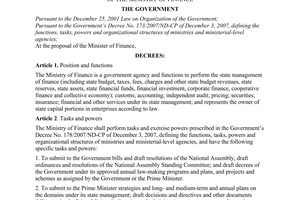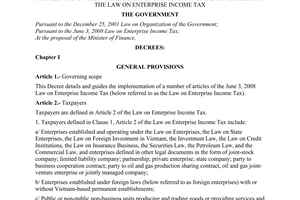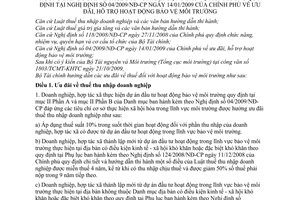Circular No. 230/2009/TT-BTC of December 08, 2009, guiding tax incentives for environmental protection activities prescribed in the Government's Decree no. 04/2009/ND-CP of January 14, 2009, on incentives and supports for environmental protection activities đã được thay thế bởi Circular No. 212/2015/TT-BTC corporate income tax policies environmental protection activities regulated và được áp dụng kể từ ngày 14/02/2016.
Nội dung toàn văn Circular No. 230/2009/TT-BTC of December 08, 2009, guiding tax incentives for environmental protection activities prescribed in the Government's Decree no. 04/2009/ND-CP of January 14, 2009, on incentives and supports for environmental protection activities
|
THE
MINISTRY OF FINANCE |
SOCIALIST
REPUBLIC OF VIET NAM |
|
No. 230/2009/TT-BTC |
Hanoi, December 08, 2009 |
CIRCULAR
GUIDING TAX INCENTIVES FOR ENVIRONMENTAL PROTECTION ACTIVITIES PRESCRIBED IN THE GOVERNMENT'S DECREE NO. 04/2009/ND-CP OF JANUARY 14, 2009, ON INCENTIVES AND SUPPORTS FOR ENVIRONMENTAL PROTECTION ACTIVITIES
Pursuant to the Law on
Enterprise Income Tax and guiding documents;
Pursuant to the Law on Value-Added Tax and guiding documents;
Pursuant to the Government's Decree No. 118/2008/ND-CP of November 27, 2008,
guiding the functions, tasks, powers and organizational structure of the
Ministry of Finance;
Pursuant to the Government's Decree No. 04/2009/ND-CP of January 14, 2009, on
incentives and supports for environmental protection activities;
After obtaining opinions of the Natural Resources and Environment Ministry (the
Environment Administration) in Official letter No. 1803/TCMT-KHTC of October
21, 2009,
The Ministry of Finance guides tax incentives for environmental protection
activities as follows:
Article 1. Enterprise income tax incentives
1. Enterprises and cooperatives implementing environmental protection investment projects specified in Section II, Part A and Section II, Part B of the List promulgated together with Decree No. 04/2009/ND-CP and satisfying basic criteria of socialization in the environmental domain are eligible for enterprise income tax incentives as follows:
a/ The tax rate of 10% for incomes of enterprises and cooperatives implementing environmental protection investment projects throughout their operational duration.
b/ Tax exemption for 4 years, counting from the time of generating taxable incomes, and 50% reductions of payable tax amounts for 9 subsequent years for new enterprises and cooperatives established under environmental protection investment projects in areas with socio-economic difficulties or extreme socioeconomic difficulties specified in the Appendix to the Government's Decree No. 124/2008/ND-CP of December 11, 2008, detailing and guiding a number of articles of the Law on Enterprise Income Tax.
c/ Tax exemption for 4 years, counting from the time of generating taxable incomes, and 50% reduction of payable tax amounts for 5 subsequent years for new enterprises and cooperatives established under environmental protection investment projects in areas outside the list of those with socio-economic difficulties or extreme socio-economic difficulties specified in the Appendix to the Government's Decree No. 124/2008/ND-CP.
2. Enterprise income tax incentives specified in Clause 1 of this Article are applicable only to incomes from environmental protection activities; in case enterprises and cooperatives operating in the environmental protection domain conduct other production and trading activities, they shall separately account incomes from environmental protection activities to correctly declare and determine enterprise income tax incentives.
In case in a tax period, enterprises and cooperatives cannot separately account incomes from environmental protection activities from those from other production and trading activities, income from environmental protection activities shall be determined to be (=) their total taxable income from production and trading activities (excluding other incomes) multiplied by (x) the percentage (%) of revenue from environmental protection activities against their total turnover in the tax period.
3. Income from environmental protection activities eligible for tax incentives specified in this Article is an amount generated from environmental protection projects which satisfy basic criteria of socialization in the environmental domain, including proceeds from the sale of products salvaged in the implementation of these projects and income from scientific researches in waste and wastewater treatment.
4. The size and other basic criteria of socialization in the environmental domain comply with the List of types, size criteria and standards of establishments mobilizing social resources provided for by the Prime Minister.
Article 2. Value-added tax incentives
Machinery, equipment and supplies which cannot be manufactured at home and need to be imported for direct use in scientific research and technological development by organizations or individuals conducting environmental protection activities specified in Clause 2, Article 2 of Decree No. 04/2009/ND-CP are not subject to value-added tax.
The Ministry of Planning and Investment shall promulgate the list of machinery, equipment and supplies which can be manufactured at home as a basis for identifying those which cannot be manufactured at home and need to be imported for direct use in scientific research and technological development and are not subject to value-added tax.
To identify goods not subject to value-added tax in the stage of importation specified in this Article, importers shall present to customs agencies dossiers under the Finance Ministry's guidance on customs procedures; customs inspection and supervision; import and export duties and tax administration of imports and exports.
Article 3. Expenses for product advertisement and sorting of garbage at source
1. Expenses for advertising products turned out from environmental protection activities, making scientific films and reportages on environmental protection and supplying free of charge tools for people to sort daily-life garbage at source specified at Points a, b and c, Clause 1, Article 21 of Decree No. 04/2009/ND-CP paid by enterprises and cooperatives with environmental protection investment projects may be accounted as deductible ones upon the determination of enterprise income tax-liable incomes if these expenses have adequate invoices and documents as regulated.
2. Expenses for advertising products turned out from environmental protection activities specified in Clause 1 of this Article include the following:
a/ Expense for holding seminars on production methods and utilities of these products;
b/ Expense for market research: investigation, survey, interview, collection, analysis and evaluation of information concerning these products;
c/ Expense for market research, development and support;
d/ Expense for hiring consultants to conduct market research, development and support;
e/ Expense for product exhibition and introduction and organization of commercial fairs and exhibitions: expense for opening product show-cases; expense for hiring space to exhibit and introduce products; expenses for materials and tools used in product exhibition and introduction; and expense for transport of exhibited or introduced products;
f/ Expense for advertising products turned out from environmental protection activities through providing financial supports for educational and healthcare activities, mitigating natural disaster consequences and building houses of gratitude for the poor in accordance with the Law on Enterprise Income Tax and guiding documents.
3. Scientific films or reportages on environmental protection specified in Clause 1 of this Decree include:
a/ Films to popularize and improve public awareness about environmental protection and use of environmentally friendly products with ecological labels awarded by State-accredited organizations.
b/ Scientific films or reportages to popularize knowledge about sorting garbage at source: reduce-reuse-recycle (3R).
4. Tools supplied free of charge for people specified in Clause 1 of this Article include: waste baskets or bags of different sizes and colors for containing organic and inorganic garbage separately.
In case enterprises and cooperatives with environmental protection investment projects supply free of charge tools for people to sort daily-life garbage at source mentioned in this Article together with leaflets explaining how to sort out organic and inorganic solid wastes, expense for producing these leaflets may be also accounted as deductible one upon determination of enterprise income tax-liable incomes.
Enterprises and cooperatives supplying free of charge tools for people specified in this Article shall comply with regulations on invoices and documents and also make a list stating the full names and addresses of persons provided with such tools; quantity and value of each kind of tools; signatures of these persons; and signature of the at-law representative or an authorized person of the enterprise.
The at-law representative or an authorized person of the enterprise shall put his/her signature to the list of tools provided free of charge and take responsibility before law for the accuracy and truthfulness of the list.
Article 4. Organization of implementation
1. This Circular takes effect 45 days from the date of its signing.
2. Any difficulties arising in the course of implementation should be promptly reported to the Ministry of Finance for study and additional guidance.-
|
|
FOR
THE MINISTRY OF FINANCE |






